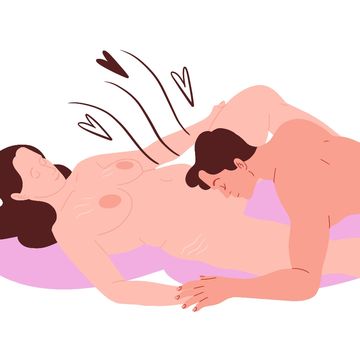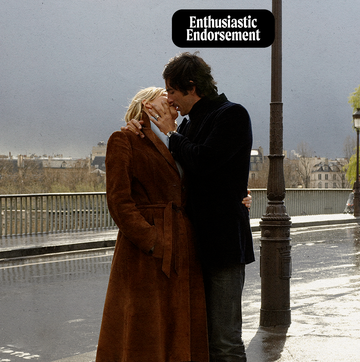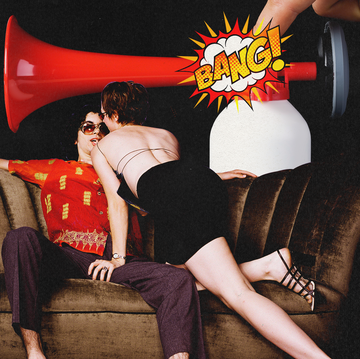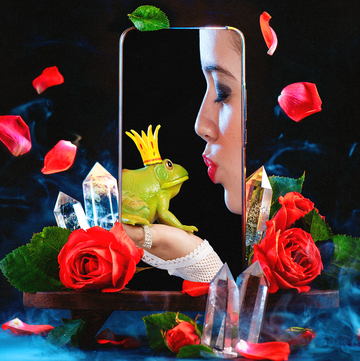It can feel a little retrograde (not the Mercury kind) to talk about marriage and “social status” in this, the year 2022. Sure, we may all still be crushing on Mr. Darcy (Colin Firth or Matthew Macfadyen: choose your player), but life isn’t a Jane Austen novel. No one’s running around desperately trying to lock down a partner for the sake of financial security or societal perks anymore—like, we’re past that, right? Yeah, I’m afraid I have some bad news.
An uncomfortable reality—particularly for those of us who pride ourselves on being modern, independent individuals in loving, equal, and fully radicalized relationships that obviously have nothing to do with patriarchy or any other such sexist nonsense—is that our society still very much rewards marriage and monogamy with what Nona Willis-Aronowitz refers to as a “status bump” in her new book, Bad Sex: Truth, Pleasure, and an Unfinished Revolution. That status bump may be less obvious than it was in Jane Austen’s day, or even when our parents got married, but we still see it all the damn time—and I’m not even just talking about the many legal perks our government reserves for married couples.
We congratulate our friends and buy them gifts for getting married or engaged, for example, and plus-ones to their weddings are usually reserved for people in similarly “serious” relationships (read: married or cohabiting, presumably monogamous ones). Maybe bringing home a boyfriend for Thanksgiving finally freed you from the kids’ table, or maybe you just felt like all your couple friends started taking you more seriously once you finally got in a relationship and deleted Tinder.
All these status bumps—from our friends, from our government, and from that one aunt who always has to know if you’re “seeing anyone yet”—are our reward for progressing along a little thing known as the relationship escalator.
The relationship what now?
Essentially, the relationship escalator is the traditional package of societal expectations—monogamy, marriage, getting a dog and settling down in the suburbs with a white picket fence and a couple of kids—arranged in a hierarchical order. Completing these steps is the metric by which we (and our friends and our judgmental aunts and our political leaders) typically measure how “serious” a relationship is. The term was coined by journalist Amy Gahran in her blog, Solopoly, and later became the subject of her 2017 book, Stepping Off the Relationship Escalator. Gahran defined the relationship escalator as:
“The default set of societal customs for the proper conduct of intimate relationships. Progressive steps with clearly visible markers and a presumed structural goal of permanently monogamous (sexually and romantically exclusive), cohabitating marriage—legally sanctioned, if possible. The social standard by which most people gauge whether a developing intimate relationship is significant, ‘serious,’ good, healthy, committed or worth pursuing or continuing.”
But while the relationship escalator may be a relatively new term, it’s hardly a new phenomenon. Sure, there have been a few additions and revisions over the years—like, we would probably judge our friends for getting married before moving in together these days, while our grandparents’ friends would’ve gossiped about the opposite over brunch or whatever people did on Sundays back then—but couples have been riding the relationship escalator for generations.
Not to mention, we internalize these ideas at a pretty young age. Remember that rhyme we used to tease each other with in elementary school? “First comes love, then comes marriage, then comes Kayla with the baby carriage.” Yeah, that’s basically the Relationship Escalator: Schoolhouse Rock Edition. Except now, instead of teasing each other about it, we pretty much prescribe it.
“The relationship escalator is the societal assumption that if you get into a relationship, you have to complete certain steps in order to ensure that the relationship is serious or valid or recognized in some way,” says non-monogamy educator Leanne Yau, founder of Poly Philia. Once you start dating someone, the expectations that your relationship is going to progress in a certain way start rolling in. Maybe your friends start asking if you’ve made it exclusive yet, or maybe you and your partner go on vacation and everyone seems to be expecting you to come back with a ring. Maybe you’ve even had some of those questions or expectations about your own relationship, like, “How serious are we if we haven’t made it Instagram official yet?”
“The reason it’s called the relationship escalator as opposed to the relationship ladder or the relationship stairs is because the escalator is automatic, it’s unconscious, and it’s unquestioned,” says Yau. In other words, it’s just what everyone expects you to do.
“It presumes the ultimate goal of any relationship is a long-term, committed, monogamous relationship, codified in marriage,” says Stephen Quaderer, CEO of ThotExperiment and creator of the sex-positive dating app, Headero. “While the term may be unfamiliar, the expectation is anything but given its pervasiveness. We’re expected to meet, go on a date, have sex, fall in love, move in together, get married and have kids—and in that order.”
So, is the relationship escalator bad?
To be clear, there’s nothing wrong with wanting these things. It’s very normal and fine to want to start dating someone, soft-launch your relationship on Instagram, be monogamous, and have them put a ring on it so you can show off to all your friends. Do I, personally, think that all sounds pretty boring? A little bit, yes! But that’s not really any of my business. Do I think it means you’re just blindly following a societal script because you think it’s what you’re “supposed” to do? Secretly, yes, kind of! Not necessarily!
Look, the point is, there’s nothing wrong with the individual steps of the relationship escalator in and of themselves. We’re all well within our right to get a dog, move to the suburbs, show off that ring on Instagram, and die in presumed wedded bliss behind a white picket fence if we want to. You do you, babe.
That said, there are a few things that make the relationship escalator itself what we might call ~problematic~.
For one thing, the positioning of marriage and monogamy as the societal “ideal” and/or the ultimate end goal of every relationship ignores and invalidates the experience and values of non-monogamous and polyamorous people/literally everyone else who doesn’t happen to go about building relationships in this particular way.
“Its entire conception is that it’s a one-way path to an idealized relationship—and unfortunately, the ‘ideal’ in this context isn’t non-monogamy or polyamory,” says Quaderer. Moreover, he adds, the experience of many people in the non-monogamous and polyamorous communities is inherently at odds with the concept of an “escalator” that measures the seriousness of relationships in terms of exclusivity.
“It’s a common myth that polyamorous people are less committed than monogamous folks,” says Mia Lee, a sex worker and CFO of Petit Mort Magazine. “In fact, I’d say we’re more committed and intentional because we don’t need to choose each other at the exclusion of all others.”
Not only does the relationship escalator suggest that non-monogamy is at odds with “commitment,” but it also ignores the fact that relationships—romantic, sexual, or otherwise—don’t necessarily have to be “committed” to be meaningful. People who practice solo polyamory or relationship anarchy, for example, may forge fulfilling, romantic, and/or emotionally intimate relationships that don’t involve any kind of commitment at all. The relationship escalator ignores and invalidates all of these experiences and instead sets up a binary: either you’re exclusive and on your way to a wedding in Italy à la Kravis so your relationship is therefore serious and valid, or you’re basically just hooking up.
Do I need to get off the relationship escalator?
Okay, so holding others to the expectations of the relationship escalator is obvs problematic. But the relationship escalator isn’t exactly good for you and your relationship, either—yes, even if you want monogamy and marriage and kids and all those things. Why? It comes back to Yau’s point about it being a metaphorical escalator instead of metaphorical stairs or a ladder: it’s unconscious, it’s unquestioned, and it’s automatic.
“The individual steps of the relationship escalator are not harmful in and of themselves,” says Yau. “But I think that not questioning these steps, not questioning whether you actually want to do these things and just doing them because you think you’re supposed to, is where the harm originates.”
Not to mention, measuring the success or seriousness of your relationship by relationship escalator standards might raise doubts or insecurities that can threaten an otherwise totally happy and smooth-sailing partnership. Feeling like you need to prove your love to yourself, your partner, and/or the world by checking off certain boxes is not only a recipe for disaster (for reference, see the absolute shitshow that is Netflix’s The Ultimatum), but it also takes away your agency in defining what makes your relationship meaningful on your own terms.
“I think adhering to any societal norm that doesn’t suit you is inherently problematic and harmful,” says Lee. “I think it’s important for people to know what they want and seek that out, whether or not what they want aligns with established social norms.”
Again, I’m not saying that everyone who pursues a traditional, monogamous relationship that culminates in marriage is just blindly following societal norms like a lab rat in a maze. Traditional monogamous relationships can absolutely be forged with purpose and intent, without hopping on ye olde relationship escalator.
“The normative path described by the relationship escalator can, and many times does, lead to a perfectly happy and healthy relationship outcome,” says Quaderer. The key is checking in with yourself and your partner and making sure the steps you’re taking are steps you both actually want to be taking, and not just because you want to cop those sweet status bumps.
“Everyone, monogamous or polyamorous, should question the relationship escalator,” says Yau. “You can pick and choose the things that you want in a relationship and the things that you don’t, and if people give you shit for that, that’s their problem.”
That doesn’t have to mean throwing away your dreams of monogamy and marriage and a big fancy wedding and a KitchenAid stand mixer. It’s totally fine and normal to want those things (especially the KitchenAid!). But if you do, you might wanna take the stairs.
Kayla Kibbe (she/her) is the Associate Sex and Relationships Editor at Cosmopolitan US, where she covers all things sex, love, dating and relationships. She lives in Astoria, Queens and probably won’t stop talking about how great it is if you bring it up. Follow her on Twitter and Instagram.













